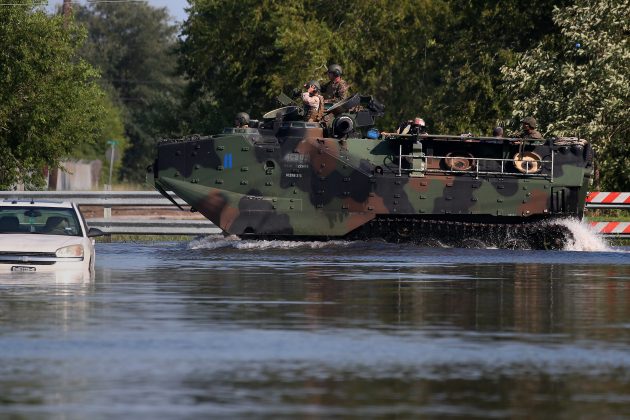By Emily Flitter and Andy Sullivan
PORT ARTHUR, Texas/HOUSTON (Reuters) – A week after Hurricane Harvey came ashore in Texas, rescuers kept up a marathon search for survivors on Friday as large pockets of land remained under water after one of the costliest natural disasters to hit the United States.
The storm has displaced more than 1 million people with 44 feared dead from flooding that paralyzed Houston, swelled river levels to record highs and knocked out the drinking water supply in Beaumont, Texas, a city of about 120,000 people.
Chemicals maker Arkema SA and public health officials warned of the risk of more explosions and fires at a plant owned by the company. On Thursday blasts rocked the facility, about 25 miles east of Houston and zoned off inside a 1.5-mile (2.4-km) exclusion zone, after it was engulfed by floodwater.
With the presence of water-borne contaminants a growing concern, the National Weather Service issued flood watches from Arkansas into Ohio on Friday as the remnants of the storm made their way through the U.S. heartland.
The Neches River, which flows into Beaumont and nearby Port Arthur, was forecast for a record crest from Friday well above flood levels. The flooding and loss of drinking water forced the evacuation of a hospital on Thursday.
Two of the last people remaining in their flooded home near the river, Kent Kirk, 58, and Hersey Kirk, 59, were pulled to safety late Thursday.
“They were the last holdouts, the last house,” said Dennis Landy, a neighbor who had spent the day in his airboat ferrying people from a small, remote group of houses near Rose City, Texas, close to the Neches’ banks, to safety.
It took an hour of coaxing by a rescuer but Hersey Kirk finally let herself be carried from her wheelchair to the airboat and then to a Utah Air National Guard helicopter.
“I’m losing everything again,” she said. “We got flooded in Ike, in Rita. My husband just got a new car – well it was new to him anyway. It’s sitting in 5 feet of water.”
Harvey roared ashore late last Friday as the most powerful hurricane to hit Texas in half a century. It dumped unprecedented quantities of rain and left devastation across more than 300 miles (482 km) in the southeast corner of the state.
COST OF UP TO $75 BILLION
Moody’s Analytics estimated the economic cost from Harvey for southeastern Texas at $51 billion to $75 billion, ranking it among the costliest storms in U.S. history. Much of the damage has been to Houston, the U.S. energy hub.
At least 44 people were dead or feared dead in six counties including and around Houston, officials said. Another 19 remained missing.
Some 779,000 Texans have been told to leave their homes and another 980,000 fled voluntarily amid dangers of new flooding from swollen rivers and reservoirs, according to federal estimates.
Tens of thousands crowded in evacuation centers across the region.

Evacuees affected by Tropical Storm Harvey take shelter at the George R. Brown Convention Center in downtown Houston, Texas, U.S. August 31, 2017. REUTERS/Carlos Barria
A new hurricane, Irma, had strengthened into a Category 3 storm, the midpoint of the five-step Saffir-Simpson scale, on Friday. It remained hundreds of miles from land but was forecast to possibly hit the U.S. territory of Puerto Rico, the Dominican Republic and neighboring Haiti by the middle of next week.
Seventy percent of Harris County, which encompasses Houston and has a population of about 4.6 million people, was covered with 18 inches (45 cm) or more of water, county officials said.
As signs of normal life returned to Houston, the nation’s fourth most populous city, there were concerns about health risks from bacteria and pollutants in floodwater.
The Houston Astros baseball team, forced to play away from the city due to the floods, will return and play at its home field on Saturday. It has invited shelter residents to attend its double header against the New York Mets, Houston Mayor Sylvester Turner said on his Twitter feed.
Flooding has shut some of the nation’s largest oil refineries and hit U.S. energy infrastructure, which is centered along the Gulf Coast. It has sent gasoline prices climbing and disrupted global fuel supplies. [O/R]
The national average for a regular gallon of gasoline rose to $2.519 as of Friday morning, the highest since August 2015, up 17 cents since before the storm hit, according to motorists advocacy group AAA.
The storm knocked out about a quarter of U.S. oil refining capacity and the signs of restarts were tentative.
In major Texas cities including Dallas, there were long lines at gas stations, prompting state regulators to tell people they were sparking a panic and saying there were ample fuel supplies.
Power outages had decreased from peaks of over 300,000 to about 160,000 homes and business in Texas and Louisiana as of Friday morning, data from utilities showed.
(Additional reporting by Richard Valdmanis, Marianna Parraga, Ernest Scheyder, Ruthy Munoz, Peter Henderson and Andy Sullivan in Houston, David Gaffen in New York, Jon Herskovitz in Austin, Texas, and Brendan O’Brien in Milwaukee; Writing by Scott Malone Jon Herskovitz; Editing by Chizu Nomiyama and Bill Trott)
 A Marine Corp vehicle patrols a flooded street as a result of Tropical Storm Harvey in Port Arthur, Texas, U.S., August 31, 2017. REUTERS/Carlo Allegri
A Marine Corp vehicle patrols a flooded street as a result of Tropical Storm Harvey in Port Arthur, Texas, U.S., August 31, 2017. REUTERS/Carlo Allegri



